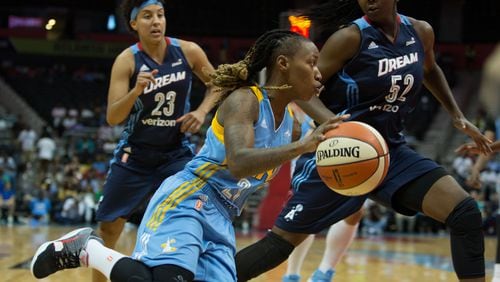When NBA players finish a basketball season, they go on vacation, volunteer or spend time with family.
When WNBA players finish their seasons, most leave friends, family and the familiarity of America to go overseas. Not to be a tourist — but to experience a fuller women’s basketball.
Atlanta Dream center Elizabeth Williams knew she would play overseas basketball even before she finished college at Duke.
During her rookie season in 2015 with the Connecticut Sun, Williams was limited by injury, so playing overseas in her first offseason allowed her to gain more confidence on the professional level. Along with several other Dream teammates, Williams’ purpose in choosing overseas play this offseason was to earn more money.
When playing for overseas teams, WNBA players can make up to 15 times more money than their WNBA salaries, according to Newsday.
While Williams played with the Russian team Nadezhda Orenburg this offseason, with WNBA players Amanda Zahui B. (New York Liberty) and Tiffany Mitchell (Indiana Fever), several other members of the Dream also played overseas.
“From our team, I think it was just about everyone (but guard Layshia Clarendon),” Williams said. “One of the reasons Lay doesn’t go is just (last time) she went, I remember she was saying her back started flaring up because you’re playing year-round, so it’s a lot of wear and tear. She just didn’t really like the experience. You’re away from home, you’re away from your family and your friends, but I think a lot of us are willing to sacrifice that and make some extra cash.”
Clarendon scored six points in nine minutes Friday night as the Dream
lost their exhibition game, 113-67 against the Minnesota Lynx. The Dream
open the season at the Connecticut Sun at 7 p.m. May 13.
The average NBA salary in the 2013-14 season was $4.9 million, according to Forbes. The WNBA's maximum salary in the 2015 season was $107,500, according toVice Sports.
While playing overseas basketball allows women to make extra money, it also revealed to Williams how the apathy for women’s professional athletics is intensified in the United States.
This offseason with Nadezhda Orenburg, Williams saw packed stadiums and screaming fans in Russia and Europe that proved how many cultures do support women’s sports.
“People just don’t respect women sports heroes as much,” Williams said. “I think (in the United States), people almost want to seem too cool for women sports.”
While the WNBA fan base is smaller than the NBA's, it is on the rise. In 2016, WNBA game attendance reached record levels, increasing 4.6 percent while viewership on ESPN and ESPN2 increased 11 percent, according to SB Nation.
Encouraging more growth, the WNBA announced 20 games will live stream on Twitter in the 2017-18 and 2018-19 seasons.
So how does the gap between the WNBA and NBA continue to narrow?
For Williams, the age gap between the WNBA and NBA explains the discrepancies in funds and in generational fans. The WNBA celebrated its 20th anniversary this past season, while the NBA will celebrate its 72nd in August.
Despite time working against them, the Dream players adamantly continue the fight by first putting on a good show.
“We want to be fast, active, fun, exciting games to watch,” Clarendon said. “We want to be like the (Golden State) Warriors. We want to be up there and then getting butts in the seats, right? So when people tuning in on the television to the games, there’s people there. It’s an exciting environment.”
Clarendon currently sits on the executive committee for the WNBA players’ union and Williams serves as a player representative. From their positions, the two Dream players see firsthand how the WNBA works for equality.
“I know when we’re on the calls with (WNBA President Lisa Borders) she’s always trying to do something new, talking with (NBA Commissioner) Adam Silver a lot and trying to continue to get us to grow,” Williams said. “We’re young league, but we’ve done a lot in a short period time, and I think having the league and the union in constant communication with us has been really good.”
In a recent call with Borders, the WNBA encouraged teams and players to be personable with fans by sharing stories and being involved in the community.
On April 26, Clarendon wrote an open letter revealing that she was sexually assaulted. Clarendon shared her story to help sexual-assault victims know they’re not alone and hopefully change the culture. While her letter’s purpose wasn’t to recruit new fans, if being vulnerable encourages some to become WNBA fans, it would only be a bonus to being an advocate for change.
Unlike Clarendon, Williams didn’t feel obligated to use her platform when she first entered the WNBA. The then 22-year-old had the mindset of “just do your thing, do your job, do it well and just kind of go on.” After becoming close with Clarendon, Williams acknowledges she has grown into an advocate for women’s equality.
No matter how slow the needle moves, Williams and Clarendon found worth in dedicating their influences and voices to make the league better for future generations of WNBA stars.
“I think we do play huge role in (social change), and I also think when I look back and I think about how I used to watch the WNBA a lot when I was younger and being able to see the stories and see the strong, beautiful, powerful women, it made an impact on what I’m doing today,” Williams said.
“They’re the reason that I’m able to play this game, and I making more than they were. They left the league better than it was, so I think right now I have a duty to leave the league now better than it was for the people that come after me.”






